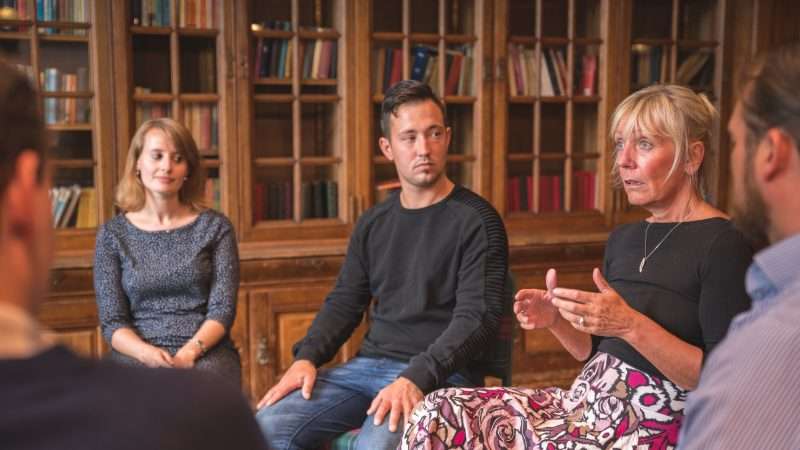
12 Step Residential Treatment
At Castle Craig, we provide dedicated care in the UK for those struggling with drug and alcohol addiction, offering an ideal and restorative place to retreat and work on your recovery. Located in the peaceful pastures of West Linton, our stunning, historic environment encourages deep healing and reflection. Every patient can access the care and expertise of our experienced, psychiatrist-led team, who are committed to supporting every step of your sobriety journey.
Our focus is on creating an individualised approach, ensuring that your well-being remains at the heart of everything we do. Contact us today on 01721 546 263 to find out more about our addiction rehab treatment and how we can support your path to lasting change. We understand how challenging the first step can be for you or your loved one, and our team is always ready to listen and provide the reassurance you need to make this life-changing decision.
What is a 12 Step Addiction Recovery Programme?
A 12 Step addiction recovery programme is a structured method designed to help individuals overcome substance addiction by focusing on personal growth, accountability and making positive changes. It offers a clear pathway through guided steps, encouraging participants to take responsibility for their actions and commit to lasting transformation.
The 12 Step programme often includes regular group meetings where you can share experiences and build support networks with others. At the heart of the process are self-reflection, spiritual exploration and practical actions such as making amends. By working through the steps with the guidance of a sponsor and help from peers, many have found the 12 Step method to be a meaningful and effective approach.
History of Twelve Step Rehabilitation
The Twelve Step model began in the 1930s with the founding of Alcoholics Anonymous (AA). It was created by people who had suffered from addiction themselves and wanted to look for a way to recover through mutual support and shared experiences. The programme introduced practical steps and a community-based ethos that has since inspired millions worldwide.
The popularity of the 12 Step programme lies in its easy accessibility and the strong sense of community it provides. Many people find reassuring comfort in connecting with others who understand their struggles, while the structured nature of the steps gives clear guidance that is practical to follow. The Twelve Step model focuses on long-term recovery as well as personal growth, and has had a significant impact on countless lives.

Start Your Recovery at a Residential Rehab Today
Free Substance Addiction Assessment
At Castle Craig, we provide free drug and alcohol addiction assessments during our admissions process, offering you a vital first step towards recovery. This initial consultation is designed to understand your personal situation, making sure you feel heard and supported as you begin your journey to a healthier future.
Following the assessment, our team can develop a personalised residential treatment plan tailored to your needs. This ensures that every aspect of your care is aligned with your recovery goals and gives you the best possible foundation for lasting change. Take the first step today and call us on 01721 546 263 – we’re here to help you.
List of the 12 Steps of Recovery
The 12 Steps of Recovery provide a clear and organised framework to help people overcome substance addiction and rebuild their lives successfully. By focusing on self-awareness, personal accountability and connecting with a supportive community, they can guide you towards making positive, sustainable changes. Below, we explore the list of the 12 steps of recovery, their purpose and how they can support your sobriety journey.
-
Step 1: Admitting Powerlessness The First Step in Recovery
The first step of the 12 Step programme is about acknowledging that addiction has taken control, leaving you feeling a sense of powerlessness over your actions. By recognising this, you can lay the foundation for change and open the door for honesty and acceptance, both of which are key to beginning your journey. The first step is not about weakness but rather about taking a brave step towards clarity.
Through admitting powerlessness, you can stop fighting the battle alone and show a willingness to step into recovery. It’s an act of courage that helps you move from a mindset of denial to a mindset that is ready to accept help, creating space for freedom from addiction to establish.
-
Step 2: Believing in a Higher Power for Strength
Step two introduces the idea of a Higher Power – a source of strength greater than yourself. The Higher Power is not tied to any specific religion; rather, it’s a personal and open-ended belief that provides comfort and guidance on your 12 Step path. For many, the second step is about finding new hope after feeling trapped in despair.
A sense of faith can help to release feelings of isolation and encourages reliance on trust rather than willpower alone, which can sometimes feel challenging and even hopeless. By recognising that help is available in places beyond yourself, you can begin to regain strength and resilience as you continue to move through the 12 Step process.
-
Step 3: The Surrender Process Letting Go of Control
The third step involves surrendering control and placing trust in the Higher Power to guide your recovery. It’s about understanding that holding onto control has not worked for you in the past and encouraging openness to new ways of thinking and acting.
The third step also helps to ease the burden of feeling like you need to fix everything yourself. By letting go, you can create space for growth and allow support, guidance and positive changes to enter your life, one day at a time.
-
Step 4: Personal Inventory Honest Self-Reflection
Step four encourages you to take an honest inventory of your life. This self-reflection involves examining past behaviours, thoughts and actions to better understand how alcohol, drug or behavioural addiction has affected you and those around you. It inspires you to be courageous and truthful in facing your reality.
Taking a personal inventory allows you to identify patterns and areas for improvement. By acknowledging these honestly, you can gain clarity on the changes needed to grow, laying the groundwork for meaningful development.
-
Step 5: Admitting Faults Peer Support and Sponsor Guidance
The fifth step involves sharing your personal background, fears and goals with another person, often your sponsor or a trusted peer. Admitting your faults to someone else creates accountability and relieves the weight of keeping secrets that may have been burdening you for many years. It’s a vital step in building trust and transparency in the 12 Step programme for addiction.
Having guidance from someone you trust during the process can reassure you and remind you that you’re not alone. Through sharing, you gain perspective, empathetic feedback and support as you continue your recovery work.
-
Step 6: Readiness for Change Committing to Growth
Step six is about being fully ready and open to change. It concerns acknowledgement that old habits and shortcomings may hold you back whereas committing to the opportunity for growth and improvement provides a greater chance for success.
Readiness and openness allows for a deeper connection to the 12 Step process, empowering you to take actionable steps forward. Recognising this moment is crucial in moving closer to lasting transformation for you and your loved ones.
-
Step 7: Making Amends Repairing Relationships
In step seven, you humbly ask your Higher Power for help in overcoming your shortcomings. By doing so, you show a willingness to become the best version of yourself, free from the behaviours tied to drug or alcohol addiction.
Here, you can learn the value of humility and strengthen your ability to accept help from others. The seventh step reminds you that substance addiction recovery is a collaborative effort that can achieve incredibly worthwhile results from the support of togetherness and unity.
-
Step 8: Taking Action Direct Amends Where Possible
Step eight focuses on listing the relationships affected by your addiction and being truly willing to make amends. It’s a brave step that involves acknowledging the pain you may have caused and demonstrating a commitment to making things right.
Although potentially uncomfortable and difficult, creating a list allows you to begin rebuilding trust and continue showing accountability. It’s an important and courageous part of healing both for yourself and your relationships moving forward.
-
Step 9: Taking Action Direct Amends Where Possible
Following the preparation in step eight, step nine involves taking direct action to make amends when appropriate. Whether through a conversation, an act of service or honest acknowledgment, your intentions can be turned into tangible and meaningful changes.
Making amends can be emotional, but it is a powerful part of regaining self-respect and demonstrating true commitment to lasting development.
-
Step 10: Ongoing Personal Inventory Preventing Relapse
Step ten is about continuing an honest personal inventory. It involves taking daily stock of your behaviour, recognising when you’ve strayed from your values and promptly addressing any mistakes.
The ongoing practice of mindfully apprehending both positive and negative progress helps you to avoid repeating harmful patterns and reinforce your commitment to staying on track. It’s a proactive part of the 12 Step programme for addiction that allows long-term recovery to be both practical and achievable.
-
Step 11: Seeking Spiritual Awakening and Inner Peace
Through step eleven, you seek spiritual awakening, growth and inner peace. This is achieved through practices like mindful meditation, prayer or quiet reflection, aligning your goals with your Higher Power’s guidance.
By cultivating this sense of calm and direction in your step work, you can maintain focus on your recovery and build resilience against life’s stressful challenges.
-
Step 12: Service Work Giving Back to the Fellowship
The final step of the 12 steps of recovery emphasises service work and giving back to the recovery community. Sharing your experiences and offering support to others not only strengthens your sobriety journey but also helps to inspire others.
Through service, you continue to grow and contribute positively to the 12 Step fellowship. This step solidifies your recovery as a lifelong commitment to both yourself and those around you.


Are 12 Step Programmes Good for Addiction and Mental Health?
For some, the first step towards overcoming addiction is typically through medically managed detox, ensuring safety and stability during the withdrawal process. Following this, Castle Craig offers tailored therapy treatment designed to address specific personal needs and requirements, helping patients build a strong foundation for long-term recovery. Fill out our online form to find out more about how we treat mental health in our residential rehab.
Twelve-step programmes can also play a significant role in recovery, particularly for those with a dual diagnosis in which addiction coexists with mental health conditions. Their effectiveness, however, often depends on the individual and the presence of additional therapeutic and medical support. With the right combination, these programmes can support both mental and emotional healing.
At Castle Craig, we offer dual diagnosis treatment, addressing both substance misuse and mental health challenges. Conditions such as anxiety, depression and post-traumatic stress disorder (PTSD) are common among those struggling with addiction, and our expert team is equipped to provide comprehensive support for each.
We also assist individuals facing bipolar disorder, trauma-related difficulties or other mental health concerns that often accompany addiction, as well as behavioural conditions such as attention deficit disorder (ADD) Through personalised care, experienced professionals and a wide range of therapeutic approaches, we help patients regain control and move towards a healthier, more balanced state of being.
Questions About Residential Rehab?
Contact us to discuss your treatment needs with a licensed clinician.
Is the 12 Step Rehab Programme Evidence-Based?
Yes, the 12 Step Rehab Programme is considered evidence-based. Its widespread use over decades, combined with research supporting its positive outcomes, serves to highlight its credibility as a structured approach to addiction recovery. Many people have found success with its principles, making it a trusted option for many worldwide.
Studies have demonstrated the programme’s effectiveness in promoting long-term sobriety, particularly when combined with other therapeutic approaches. Its focus on accountability, fellowship support and personal growth can make it a valuable tool for those seeking to change their lives. Integrated into comprehensive, evidence-based rehab treatment programmes, it can also offer improved benefits and coping strategies for patients suffering from drug and alcohol addiction.
12 Step Drug and Alcohol Addiction Recovery programme in Scotland, UK
Castle Craig incorporates 12 Step recovery principles as the foundation of our drug and alcohol addiction therapy. From the very start of treatment, we guide you through the 12 Steps using educational talks, group therapy sessions and essential reading material. Alongside this, you will have the opportunity to attend local Alcoholics Anonymous or Narcotics Anonymous meetings within nearby towns. Each person is encouraged to move through the steps at a pace that feels right for them, giving space for meaningful and lasting progress.

Contact Castle Craig Addiction Recovery Centre
Castle Craig’s private rehab estate, just 20 miles south of Edinburgh, provides a peaceful and healing setting for recovery. Our picturesque destination allows you to focus on your rehabilitation away from the stresses of daily life while enjoying the natural beauty of our breath-taking estate and surroundings.
Call our team today on 01721 546 263 to ask about our residential treatment.
Find Us
01721 546 263
info@castlecraig.co.uk
Castle Craig,
West Linton, Edinburgh, United Kingdom, EH46 7DH
To learn more about our residential treatment for drug and alcohol addiction, call us today on 01721 546 263. Our compassionate team is here to support you and guide you towards the best treatment options for your needs and priorities.
-
How to Find Twelve Step Rehab Programme Near You
Finding the right 12 Step rehab programme in the UK requires careful research and a focus on your personal recovery goals. Here are some ways to begin your search and help you choose a programme that aligns with your objectives:
- Search Online Using Targeted Keywords: Use specific search queries to narrow your options, such as “12 Step therapy rehab near me,” “addiction recovery near Edinburgh” or “drug rehab close to Glasgow.” Including location names can help you find relevant programmes near you.
- Check Online Reviews and Reputation: Reading reviews and testimonials can provide valuable insights into the quality of care and success rates of different programmes. Look for consistent positive feedback and patient stories that offer a clearer picture.
- Look for Specialised 12 Step Programmes: Options like dual diagnosis support (mental health and addiction combined), faith-based recovery programmes, women’s rehab services or LGBTQ+ inclusive centres may align with your specific needs and provide specialised care.
- Look for Private 12 Step Rehab Centres: Private rehab centres often offer a higher quality of care, personalised attention and high success rates. Explore if these are a suitable option for your recovery.
- Ask for Recommendations from Others in Recovery: Speak to those who’ve completed a 12 Step programme in the UK or other forms of treatment to get honest feedback and suggestions for trusted rehab centres.
- Ask About Their Treatment Amenities: Familiarise yourself with the services offered, including therapy options, fitness facilities or holistic treatments, to make sure the programme aligns with your expectations.
Choosing the right 12 Step rehab programme is an important decision. With the right research and support, you can begin your recovery journey with confidence and assurance.
Free Addiction and Mental Health Assessments at Castle Craig
At Castle Craig, we offer free addiction and mental health assessments to support you in taking the first step towards recovery. Our compassionate team is here to help you understand your needs and guide you through the process with care and professionalism.
Following your assessment, we can develop a tailored treatment plan designed just for you. This allows us to provide accurate pricing for your rehab treatment, making sure you receive the right care for your unique situation. Call today on 01721 546 263 to learn more and start your recovery journey with us.
Free Addiction Assessment
Taking the first step and asking for help can feel daunting, but our team is here to assist you.
How Long Do 12 Step Recovery Programmes last?
The duration of a 12 Step recovery programme can differ widely depending on personal needs and the type of support you choose, such as inpatient, outpatient or aftercare services. Each person’s requirements are unique, and the programme is designed to fit their specific circumstances.
To understand what might be most suitable for you, we encourage you to contact Castle Craig so that our friendly team can discuss your situation and provide clear guidance. Fill out our online form and we will get back to you with all the information and answers that you may need. Below, you’ll find a general outline to help you explore typical 12 Step programme durations in the UK.
- Short-term Programmes: Short-term rehab programmes typically last around 7 to 30 days. These are designed to provide an intensive yet concise approach to detoxification and initial therapy. Ideal for those with less severe dependencies, these programmes offer a structured start to recovery while balancing personal or professional commitments.
- Standard Rehab Programmes: A standard rehab programme usually spans 30 to 90 days. During this period, patients benefit from a structured combination of therapy, medical care and group support. This timeframe gives you the opportunity to address the root causes of your addiction while building the skills to prevent relapse.
- Therapy and Counselling: Therapeutic support may involve both individual and group counselling sessions during rehab. These sessions can range from weeks to months, depending on personal progress. Addiction counselling is integral to understanding underlying mental health concerns and developing coping strategies for sustained recovery.
- Extended Rehab Programmes: For those requiring additional support, extended live-in rehab programmes can last between 3 and 6 months. Longer stays allow for deeper healing and the opportunity to fully establish healthy routines, gain better self-awareness and strengthen relapse prevention strategies.
- Long-term Rehab: Long-term residential rehab offers an immersive approach lasting from 6 months to a year or more. This intensive level of care may be required for individuals with chronic or severe addiction issues, providing them with the time and resources needed to repair and rebuild. Long-term rehab programmes focus heavily on reintegration and ongoing support to support sustained recovery.
-
Short-Term: 30 to 90 Days in Rehab
Many 12 Step rehab programmes introduce the steps within a structured 30, 60 or 90-day timeframe, depending on whether the setting is residential or outpatient. This critical period allows individuals to start understanding the principles of recovery through guided step work, group meetings and counselling sessions. It’s a time to focus on building a solid foundation for long-term sobriety.
During a 30 to 90 day rehab phase, participants often begin addressing the root causes of their addiction while developing strategies from the 12 Step model to stay on track. The support from trained professionals and peers provides a safe environment for change, and although this short-term approach may be just the beginning, it can serve as a powerful springboard for ongoing recovery efforts.
-
Long-Term: 6 Months to 1 Year of Active Step Work
Working through all 12 steps of recovery diligently often takes between six months and a year. This process is guided by a committed sponsor who helps individuals explore each step in depth, from taking a personal inventory to making amends. These actions are crucial for healing and rebuilding.
Throughout this extended period, you can also learn to strengthen relapse prevention skills by attending regular peer support meetings and developing healthy coping mechanisms. Long-term engagement ensures that recovery becomes a part of daily life, offering both emotional growth and practical tools to maintain sobriety.
-
Lifelong Recovery Support
Recovery doesn’t end after completing the 12 steps; it’s a lifelong commitment that requires continuous care. Many individuals choose to attend fellowship support meetings, such as AA or NA, for years after their formal recovery process. These meetings provide a source of encouragement and connection with others who share similar experiences.
Additionally, engaging in service work, mentoring newcomers and practising the Twelve Traditions helps to reinforce a sense of purpose and accountability in addiction recovery. These long-term activities ensure sobriety remains a priority while creating a fulfilling life free from substance addiction.
Does Private Health Insurance Cover Twelve Step Recovery?
Health insurance coverage for a 12 Step recovery programme can vary depending on your specific policy and provider. Many insurers offer some level of support for addiction treatment, but it’s essential to review your plan to understand the benefits and limitations that may apply.
If you are covered by an accepted policy and authorised for treatment with us, Castle Craig welcomes private health insurance patients and can help you through our admissions process once you have all the relevant approval documents. For personalised support or more information on how to pay for rehab treatment that includes 12 Step recovery programmes, contact us today and speak to our friendly team.

Contact Castle Craig Today
If you or a loved one is struggling with addiction, take the first step towards recovery by contacting Castle Craig. We are here to guide you through our residential treatment options and explain the admissions process.
To speak with a member of our team, call us today on 01721 546 263. Alternatively, you can fill out our online form to get started. We are dedicated to helping you find the path to stable abstinence and a fulfilling, sober life.
How Much Does a Comprehensive 12 Step Rehab Programme Cost?
The cost of a 12 Step rehab programme in the UK typically ranges from £650 to £1,500 per day if incorporated into a comprehensive residential treatment plan. For 30 days, this can amount to £18,000 to £40,000+, depending on the intensity and level of care required. Residential programmes often include therapy, group meetings and various support services to aid recovery from all angles.
12 Steps for Alcohol and Drug Addiction Recovery Admissions Process
At Castle Craig, the 12 Step recovery programme is person-centred and customised to fit you. Every stage of our admissions process is designed to make sure you receive the right level of care and support for a successful recovery. Here’s what to expect during the intake process:
- Initial Contact and Assessment: The first step is reaching out to us, where our team will listen to your concerns and help you take that courageous first step. A free assessment will then be conducted to explore your challenges and determine the most suitable treatment options tailored to you.
- Medical and Psychological Evaluation: Your well-being at Castle Craig is our ultimate priority. Upon your engagement with us, a detailed medical and psychological evaluation is carried out to understand your physical health and mental state. This ensures the treatment plan is fully comprehensive and addresses all aspects of your condition.
- Detox and Stabilisation (If Necessary): For those who require it, medically managed detox can be provided. This step focuses on safely managing withdrawal symptoms and helping you stabilise, ensuring both safety and comfort during this critical phase of recovery.
- Admission and Introduction to the 12 Steps: Once admitted, you’ll be warmly welcomed into our care and your personalised treatment plan will be introduced, setting clear and compassionate goals for your recovery journey. If included in your plan, you’ll then be guided through the core principles of the 12 Step programme.
- Group Meetings and Sponsor Support: Recovery is a shared experience, and you’ll join group meetings to connect with others on similar paths. Guidance from a sponsor offers one-on-one support, helping you work through the steps with encouragement and accountability.
- Ongoing Recovery and Aftercare: Post-treatment, you’ll be equipped with a robust aftercare plan to sustain your recovery. Continued support through follow-up care and engagement with fellowship meetings can help you build a meaningful life free from addiction.
Each step of our admissions process reflects our commitment to your recovery and long-term well-being, making sure you always feel supported and cared for during your time with us.
However, 12 Step rehab costs can vary significantly based on individual needs and the nature of the addiction treatment programme. Factors such as outpatient or residential care, the inclusion of medically managed detox and the duration of treatment all contribute to the final price. To get a cost breakdown for treatment at our facility, get in touch to ask for all our rehab pricing information.

Contact Castle Craig Today
Take the first move towards recovery by getting in touch with Castle Craig. Our team is here to guide you through our addiction rehab treatment, explain the admissions process and help you book a free addiction assessment. We are dedicated to providing the care and support you need to start your journey to a renewed, addiction-free life.
For more information, call us on 01721 546 263. Alternatively, you can complete our online form. Reaching out could be the life-changing decision you’ve been waiting to make, and we’re ready to listen.
Free & Confidential Assessment
Compassion, expertly delivered evidence-based practices and a patient-centred approach are at the heart of our treatment model. Request a call-back from one of our professionals on any day of the week.
-
Statistics on Mental Health and Substance Use Disorder Through Twelve Step Recovery Programmes
- Intensive 12 step recovery frameworks have been shown to outperform traditional outpatient treatments, offering emotional and psychological stability for those with severe substance use disorders.
- National treatment availability analysis reveals that UK public residential rehab capacities have faced a 41% reduction in beds over five years, underscoring the pivotal role of private rehab options for those in need.
- Around 20% of individuals entering treatment for alcohol dependency in the UK require additional psychological and peer-group recovery plans such as 12 step facilitation therapy for long-term success.
- For high-dependency cases, nearly 21% of individuals receiving treatment admit to injecting drugs, with 12 step frameworks and inpatient strategies proving highly successful.
- Over two-thirds (71%) of adults starting treatment for substance misuse in 2022-2023 reported a mental health treatment need, highlighting the importance of integrated care.
- An 8-year clinical trial found that the 12 Step method had the advantage over CBT and MET for alcohol use disorders.